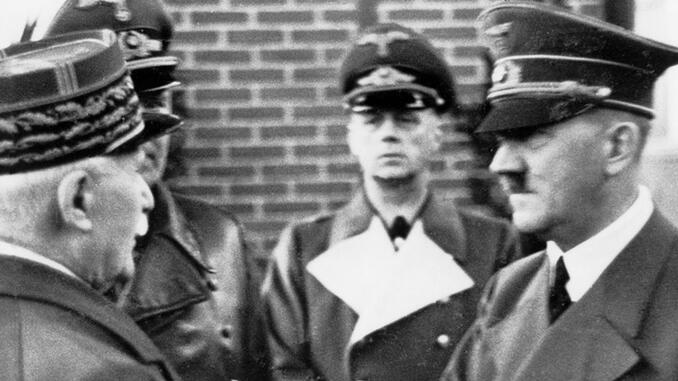
After France was conquered by the Germans in World War II, the French government relocated to the small town of Vichy in the middle of the country. In the hopes of at least keeping the situation from deteriorating worse for the French people, the Vichy government, headed by the former French general Philippe Pétain tried its best to not further precipitate the wrath of the Germans. The Vichy government produced and handed over lists of the Jews registered in France to the Germans.
On May 14th, 1941 3,710 Jews were arrested in the occupied area of France by French police. They were the first Jews in France arrested and sent to camps around the country. Throughout 1941 thousands more Jews were arrested and sent to camps. By October, Drancy, the worst camp run by the French, was so overcrowded and lacking in basic facilities, that the Nazis ordered 900 sick and dying prisoners, some described as living skeletons, to be released.
After 1941, the Jews that the French authorities rounded up were deported outside of France to places like Auschwitz. The most notorious operation to arrest and deport Jews was in July, 1942 and is referred to the Vel d’Hiver round-up. It was the largest single round-up which deported 12,884 Jews to Auschwitz.
It is argued that the best Vichy France could do was discern which Jews in the country were actual French citizens from those who were foreign Jews. This tactic only did so much for French Jews. Sixty-eight percent of the Jews deported from the country were foreign Jews, the remaining 32 percent were Jewish French citizens.
The operation was conducted voluntarily by French police and it has been argued that it was the price to pay to protect French Jewish citizens. Yet, it is noted that the Nazi’s did not have enough manpower, or even the information, to arrest and deport Jews on a scale as large.
During the war a total of 75,721 Jews were deported from France. Around 4,000 died in French camps before they could be deported. Of the deported Jews, only about 2,500 survived the war.
This tragic period is difficult for the French to come to terms with and the country as a whole was not immune from anti-Semitism. In France there are plenty of books written about this part of its history, but in the rest of the world this period is glossed over with the focus being on Charles de Gaulle and the effort to free France from the Germans.
Many ordinary French citizens did what they could to protect their Jewish friends and neighbors. Underground networks were formed. Identity documents were forged, and places were found to hide Jewish children such as Catholic boarding schools.
One journalist, Jacques Biélinky wrote about the first day he had to wear a yellow star on his clothing so authorities could tell who was Jewish and who was not. He wrote:
First day out with my star: in the street no one pays any attention to my decoration, nor at the tobacconist or newsagent. A neighbor whom I meet… says hello to me as amiably as always… In the milk queue all my acquaintances greet my amiably, and we chat as usual. No hostile looks… A wife of a friend of mine went to the cheese shop where white cheese was being distributed person by person. To show her sympathy the shopkeeper gave her two cheeses. Lobermann’s daughter was very scared she might lose her Catholic friends. In fact, they all came to her house to show their sympathy and then wanted to go out with her wearing her decoration.
Despite the laws passed against the Jews in Vichy France, many citizens rebelled in the ways they could, and in part this formed a part of the Resistance. By 1944, the French police who had been rounding up Jews had ceased any assistance, but this was to little effect. By that time Jewish arrests had increased by the Nazi’s efforts alone.
One Jewish survivor remembers a round-up of the Jewish quarter in which she lived, “I saw a policeman in uniform who was carrying a suitcase in each hand and crying. I distinctly remember those tears running down a rugged, rather reddish face because you would agree that it is rare to see a policeman cry in public. He walked down the street, followed by a small group of children and old people carrying little bundles…”
In all, some 44,000 Jews are estimated to have escaped France during the war. Geography was important to this allowing Jews to escape through the mountains, and up until 1943, Italy acted as a safe haven.
It was not until 1979 that the first French citizen was successfully indicted for helping the deportation of Jews during the war. Others have since followed, and France is coming to terms with its Vichy past.
